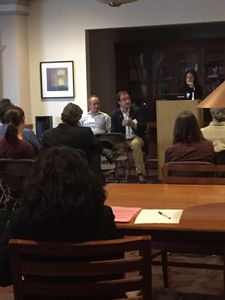CITL Annual Conference Explores Impact of Technological Trends From Scientific and Humanities angles

The Center for Interdisciplinary Teaching & Learning (CITL) recently held its annual interdisciplinary conference, this year bringing together experts from science and from the humanities to discuss the anthropocene, a proposed epoch that begins when human activities started to have a significant global impact on the planet’s ecosystems.
While technology has introduced countless conveniences, efficiencies, and modern-day miracles that shape our every day lives, it also brings with it a set of growing serious societal and ethical concerns. Experts from The Future Society at Harvard Kennedy School, the Future of Life Institute, Boston University, the University of Wisconsin-Madison, and more, gathered for a series of lectures and discussions to better understand how ecological and technological trends are influencing the planet and humanity. Reporter Elizabeth Preston provides more color around the conversations and concerns raised in her recent Boston Globe article.
Conference organizer R. Sam Deese reflects, “By defying the traditional barriers between the sciences and humanities, our conference brought together leading researchers on a wide array of urgent and emerging issues, from climate change to Artificial Intelligence. These issues are incredibly complex, but the idea behind the conference was simple: people from across the disciplines must communicate now more than ever. In sponsoring events like this, the Center for Interdisciplinary Teaching & Learning can contribute to that process.” College of General Studies faculty members Joelle Renstrom, and Charles Henebry were also organizers.
For more information on the conference, see here.